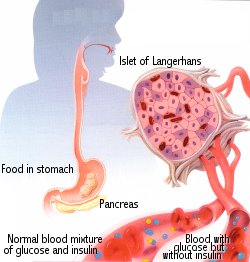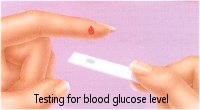Big C Discount Drugs Health Information
Blood Sugar Testing

Testing Controls Diabetes
Blood glucose testing is important in the treatment of diabetes. Starches and sugars break down into glucose. Insulin, which is released by the pancreas into the blood, helps the body use glucose for energy. If the pancreas is not able to release enough insulin for this purpose, or if the body does not efficiently utilize the insulin produced, the blood level of glucose rises. Consistently high blood glucose levels can damage the heart, blood vessels, kidneys, eyes and nerves. By carefully monitoring their blood glucose through regular testing, diabetic patients can adjust their diet, exercise and medication regimen and thus keep their diabetes under control.High Glucose is Dangerous
Knowing one's blood glucose level will provide a doctor with vital information on how well a diet, exercise or medication plan is working for the patient with diabetes. Unfortunately, diabetic patients cannot depend on how they feel to tell them if their insulin or medication is lowering their blood glucose level. Even a small increase in blood glucose over the desired level will eventually cause serious complications, such as kidney failure or blindness.The Time to Monitor: A doctor or diabetes health care professional will determine the appropriate times patients should check their blood glucose. A schedule is designed for each patient and it depends on the medication one is taking and the type and severity of the disease. Type I patients, who need to take insulin for control of their blood glucose levels, should check their blood glucose four times a day. before each meal and at bedtime, or as little as twice daily, before breakfast and at bedtime. Type II diabetics, when they first begin treatment with oral drugs, should also check their blood glucose four times a day. before each meal and at bedtime. They may also find it useful to check their blood glucose after a meal when first prescribed the drug and randomly thereafter. When their blood glucose levels stabilize, they may need to check only once daily or every other day before breakfast, with spot checks every few weeks before each meal to make sure their blood glucose pattern has stayed the same. Patients may also be instructed to check their urine for ketones when their blood glucose is higher than 240 mg/dL. Ketones are produced when there is not enough insulin in the blood and glucose cannot be used for energy. Ketones signal that the body is breaking down fat for energy and their presence indicates that diabetes is out of control.
 Testing Methods: Testing blood glucose is simple and quick. Pocket-sized electronic meters are used to measure the blood glucose in a drop of blood placed on a test strip. These meters are accurate for giving an actual blood glucose level. Some meters have special features, such as memory functions to allow patients to store their blood glucose results by date, time or before bedtime or exercise. Test strips alone can be used to give an approximate bloocl glucose level. A drop of blood is placed on the test strip and the color change is compared to a chart to estimate the blood glucose. Urine tests are no longer recommended because they are not a good reflection of the amount of glucose in the blood at the time of the test. Urine test strips are still used for checking ketones when a type I diabetic has detected a high blood glucose level.
Testing Methods: Testing blood glucose is simple and quick. Pocket-sized electronic meters are used to measure the blood glucose in a drop of blood placed on a test strip. These meters are accurate for giving an actual blood glucose level. Some meters have special features, such as memory functions to allow patients to store their blood glucose results by date, time or before bedtime or exercise. Test strips alone can be used to give an approximate bloocl glucose level. A drop of blood is placed on the test strip and the color change is compared to a chart to estimate the blood glucose. Urine tests are no longer recommended because they are not a good reflection of the amount of glucose in the blood at the time of the test. Urine test strips are still used for checking ketones when a type I diabetic has detected a high blood glucose level.Normal Readings: A normal blood glucose reading before a meal is 60-120 mg/dL and less than 140 mg/dL two hours after a meal. Each patient is given a target range set by the doctor or diabetes health care professional. For most diabetics, a target range is 80-160 mg/dL before meals, and less than 200 mg dL two hours after a meal. For others, a tighter control of blood glucose may be necessary.
Blood glucose and urine testing supplies are available in your pharmacy. The pharmacist can educate patients on how to use these devices and will also be able to answer questions about steps needed to control blood glucose.
